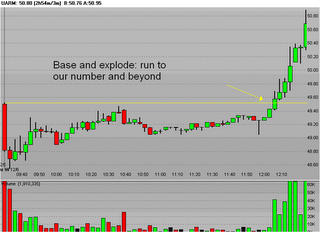
We use several time-frames: 1 minute, 3 minutes, 10 minutes, and--usually after market close--30 minutes, 60 minutes, and daily and weekly. The longer time-frames are used to identify candidates to trade on the following next day. Once the market opens we usually stick to the 3-minute time-frame. In all our years of trading, we had not met -- until very recently-- people who daytrade from a 30-minute chart. Hats off to all you traders who use the 30 min timeframe for day-trading: It is an incredible feat.
We probably would miss out on at least 90% of our selections if we used anything longer than a 5-minute time-frame. Take a look at the following two charts. The first, a 3 minute showing a "base and explode" pattern, is our bread and butter set-up. The second chart, using a 30 min time frame, gives us no information.


It's true that 30-minute frames cut out a lot of noise, but they also delete critical data (for our kind of trading). Let's use an analogy:
3-minute time-frame: Two lovers talking on the phone with, naturally, a lot of phatic communication and meaningless information including sighs, giggles, pauses, baby sounds, more adult signals, and so on. Think of how much information is conveyed when the man asks, "so how is out working out with that new guy at the office," and there is a slight pause, just an instant too long or too short, before the woman responds, in a slightly too hurried voice, "good, good, and how was your day ". So much can be read into that pause, and so much of our understanding of what someone is trying to communicate comes from the "noise" or what is not said in between the words.
30-minute time-frame: Two lovers communicating by telegraph. One writes, "How is new guy at office," and the other responds "Good". The message is received and the noise is filtered out, but along with that, so is a ton of data.
We're not writing this to change anyone's style from longer time-frames to shorter time-frames, not at all: Each style of trading requires its own means and methodology, and judging by what we have seen these last six months in various blogs, there are many traders who day-trade from a 30-minute chart, and do so successfully. We respect these traders very much and are always amazed at how many ways there are to make a living from mother market.
For our style of momentum-trading however, we have yet to come across anybody that has used a 30-minute chart. Ugly is doing something very unique, and so far quite successful, by combining daily charts with 30-minute time-frames. It's something that intrigues us very much. We have faith he will develop his system enough that it will work consistenly over time (and if not, the ATS will take over).
So, to conclude, hats off to you 30-min traders! This is a difficult business and anyone who can come up with a system to consistently pay the bills has our respect.